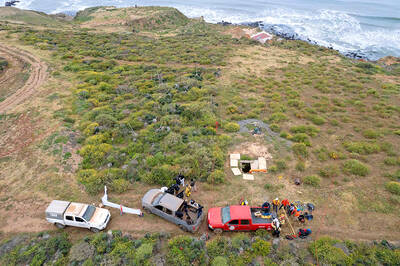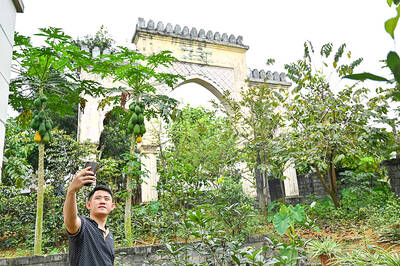Malaysia's Muslim prime minister broke new ground in national race relations yesterday, appearing for the first time at a Christian gathering to dismiss the notion that his country was governed as an Islamic state.
In an emotional speech, which followed a moving Christian prayer for his cancer-stricken wife, Prime Minister Abdullah Ahmad Badawi wiped away tears in front of dozens of priests and nuns as he appealed for religious dialogue and moderation.
"As prime minister of Malaysia, I am not a leader of Muslims but a Muslim leader of all Malaysians," the former Islamic scholar told a conference of the World Council of Churches (WCC), an umbrella group of most Christian denominations.
"Therefore I have a responsibility not just to my fellow Muslims, but also to Malaysians who profess other religions as well," he said before finishing his speech with a call for religious unity and quoting from the Bible.
Abdullah took the leadership of the 57-nation Organization of the Islamic Conference last year and has tried to galvanize a group speaking for a fifth of humanity into more effective positions on Iraq and the Israeli-Palestinian conflict.
But at home he runs a secular government ruling over a population where Muslims are a slim majority and the state religion is Islam. Almost half the population, with big ethnic Chinese and Indian minorities, follow other faiths or beliefs.
"I do not want to claim that there are no problems among the different ethnic and religious communities in Malaysia," he said.
"There are still very many things that we need to work on, but if the world ever needed a lesson in diversity and making it work, I am confident Malaysia can be a showcase," he said.
When asked after his speech why he had shed a tear, the prime minister said his mind had turned to all the suffering in the world.
But it was clear the prayer for his wife, led by a Malaysian bishop, had moved him before he rose to speak.
Abdullah's wife has been undergoing breast cancer treatment in the US.

With the midday sun blazing, an experimental orange and white F-16 fighter jet launched with a familiar roar that is a hallmark of US airpower, but the aerial combat that followed was unlike any other: This F-16 was controlled by artificial intelligence (AI), not a human pilot, and riding in the front seat was US Secretary of the Air Force Frank Kendall. AI marks one of the biggest advances in military aviation since the introduction of stealth in the early 1990s, and the US Air Force has aggressively leaned in. Even though the technology is not fully developed, the service is planning

INTERNATIONAL PROBE: Australian and US authorities were helping coordinate the investigation of the case, which follows the 2015 murder of Australian surfers in Mexico Three bodies were found in Mexico’s Baja California state, the FBI said on Friday, days after two Australians and an American went missing during a surfing trip in an area hit by cartel violence. Authorities used a pulley system to hoist what appeared to be lifeless bodies covered in mud from a shaft on a cliff high above the Pacific. “We confirm there were three individuals found deceased in Santo Tomas, Baja California,” a statement from the FBI’s office in San Diego, California, said without providing the identities of the victims. Australian brothers Jake and Callum Robinson and their American friend Jack Carter

Le Tuan Binh keeps his Moroccan soldier father’s tombstone at his village home north of Hanoi, a treasured reminder of a man whose community in Vietnam has been largely forgotten. Mzid Ben Ali, or “Mohammed” as Binh calls him, was one of tens of thousands of North Africans who served in the French army as it battled to maintain its colonial rule of Indochina. He fought for France against the Viet Minh independence movement in the 1950s, before leaving the military — as either a defector or a captive — and making a life for himself in Vietnam. “It’s very emotional for me,”

The Chinese Communist Party’s (CCP) Central Committee is to gather in July for a key meeting known as a plenum, the third since the body of elite decisionmakers was elected in 2022, focusing on reforms amid “challenges” at home and complexities broad. Plenums are important events on China’s political calendar that require the attendance of all of the Central Committee, comprising 205 members and 171 alternate members with Chinese President Xi Jinping (習近平) at the helm. The Central Committee typically holds seven plenums between party congresses, which are held once every five years. The current central committee members were elected at the